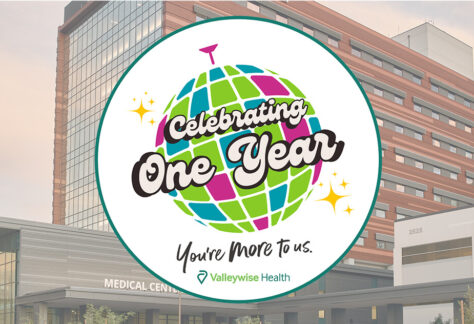In This Article:
- Valleywise Health has played an active role in putting an end to the HIV and AIDS epidemic at McDowell Community Health Center — the largest prevention and treatment center in the state.
- AIDS is the advanced stage of HIV infection. It occurs when the immune system becomes too weak to respond to other conditions, diseases and infections.
- If you suspect you may have HIV symptoms, the first step is to get tested. If your test results come back HIV positive, it’s important to seek treatment right away.
Explore the difference between HIV and AIDS, as well as its symptoms and stages. Then, learn how our McDowell CHC has all the tools you need to keep yourself and your partners safe.
Understanding the Difference Between HIV and AIDS
Human immunodeficiency virus (HIV) is a virus that attacks the body’s immune system, making a person more vulnerable to other infections and diseases. HIV transmission occurs when a person makes contact with certain bodily fluids from another individual with HIV. This most commonly happens during unprotected sex or through sharing used needles. HIV can also be spread from mother to child during pregnancy, childbirth or breastfeeding.
While there are several myths about HIV and its transmission, it’s important to note that the virus cannot spread in the air, water or through casual contact — like shaking hands, hugging and high-fiving.
AIDS is the advanced stage of HIV infection. It occurs when HIV weakens the immune system so much that it can’t effectively respond to other conditions, diseases and infections. This makes a person living with AIDS vulnerable to several illnesses, including pneumonia, tuberculosis, oral thrush and more.
Keep in mind that having HIV doesn’t necessarily mean that you will develop AIDS. People with HIV usually have a near-normal lifespan with early intervention and antiretroviral therapy. Untreated, HIV can progress to full-blown AIDS within a decade, and life expectancy after diagnosis is about three years.
Symptoms of HIV
The first few weeks after a person contracts HIV is called the acute infection stage. The virus reproduces rapidly during this time, and your immune system responds by producing HIV antibodies. Some people have no symptoms at first; however, many experience symptoms within the first month or so after contracting the disease. Early signs of HIV can include:
- Fever and chills
- Swollen lymph nodes
- General aches and pains
- Sore throat
- Upset stomach
- Headache
- Nausea
Since the symptoms of HIV are similar to the flu, many people don’t consider seeing a healthcare provider. But whether a person has symptoms or not, HIV levels in the bloodstream are very high during this period, increasing the chance of transmission to others.
People living with HIV may develop AIDS if their HIV is not diagnosed within eight to 10 years or they don’t consistently take their medication. They may also develop AIDS if they have a type of HIV that’s resistant to treatment. Symptoms of AIDS can include:
- Recurrent fever
- Chronic swollen lymph glands
- Night sweats
- Chronic fatigue
- Dark splotches under the skin or inside the nose, mouth or eyelids
- Sores, spots or lesions of the mouth or tongue
- Rapid weight loss
- Bumps, lesions or rashes of the skin
What Are the Stages of HIV?
If an individual with HIV doesn’t get treatment, they typically go through three stages of the disease:
- Acute HIV infection: This is the earliest stage of the HIV, which develops two to four weeks after infection. People often have flu-like symptoms, and the level of HIV in the blood is very high, increasing the risk of HIV transmission.
- Chronic HIV infection: This occurs when HIV is still active but reproduces at very low levels. You may not have symptoms or get sick during this stage, but the virus can still be transmitted.
- AIDS: This is the final and most severe stage of HIV. Once HIV has significantly damaged the immune system, the body can’t fight off other conditions, diseases and infections.
HIV and AIDS Care at Valleywise Health
Thanks to the Ryan White HIV/AIDS program, we’ve received adequate funding to become the largest provider of prevention, treatment and management services for HIV and AIDS in Arizona. Here, we research new ways to fight the epidemic, offer free testing and prevention services and provide support to those who have already contracted the virus.
If you suspect you may have HIV symptoms, the first step is to get tested. Valleywise Health offers a new program across all our clinics called “opt-out testing,” where first-time visitors and patients can request a rapid, same-day test to determine if they have the virus.
If you test negative, you can start taking HIV prevention drugs (known as PrEP) the very same day. If you test positive, we can begin HIV treatment the same day and will refer you to Valleywise Community Health Center — McDowell for further assistance.
There, you’ll find outpatient support and care coordination services that give you everything you need to manage your condition. The Ryan White HIV/AIDS Program enables us to provide you with:
- HIV medical care
- HIV medications
- Case management
- Oral health
- Mental health and substance abuse treatment
- Health insurance premium and copay assistance
- Nutrition services and food supplements
- Transportation
- Psychosocial services
- Housing
- Treatment adherence services
And we don’t stop there. Those who need financial support may qualify for our “sliding fee schedule.” This means that the price of treatment depends on your ability to pay. No matter your income, you deserve exceptional care that helps you live a more normal life.
Want to learn more about HIV and AIDS prevention, treatment and awareness? Talk with physicians at Valleywise Community Health Center – McDowell or call 1 (833) VLLYWSE to schedule an appointment.
Sources:
- https://www.cdc.gov/hiv/basics/whatishiv.html
- https://hivinfo.nih.gov/understanding-hiv/fact-sheets/stages-hiv-infection
- https://www.medicalnewstoday.com/articles/323832
- https://www.cdc.gov/hiv/risk/prep/index.html
- https://www.medicinenet.com/how_long_can_you_live_with_hiv/article.htm
- https://www.azdhs.gov/documents/preparedness/epidemiology-disease-control/disease-integrated-services/hiv-epidemiology/reports/2020/annual-report.pdf







